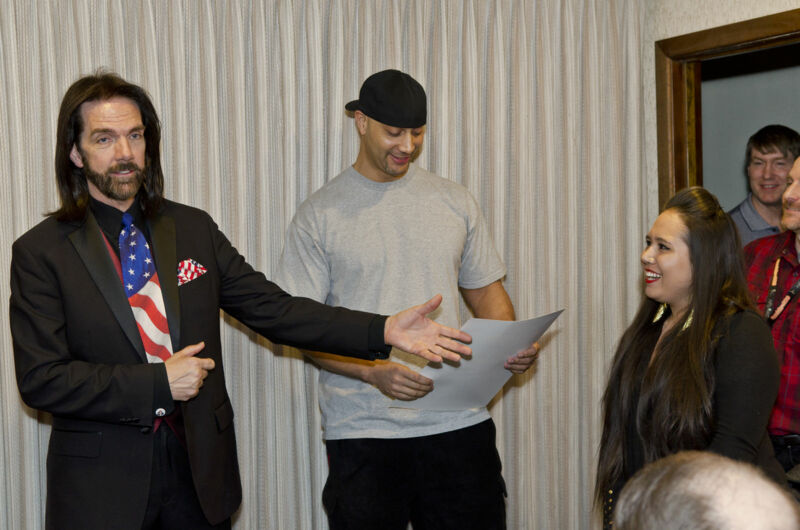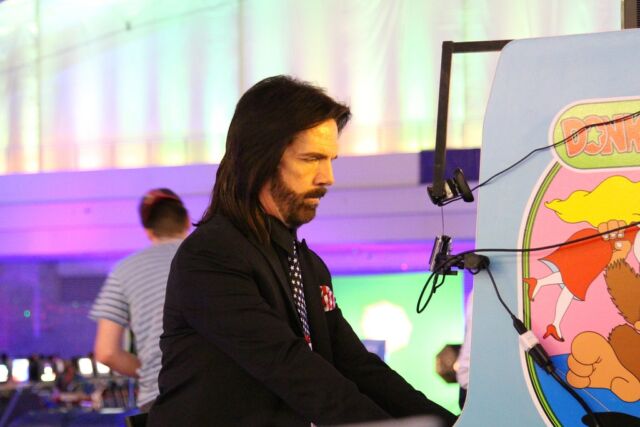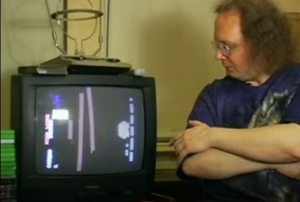
In May, Ars Technica was the first to report on a Los Angeles County defamation lawsuit brought against Twin Galaxies over the video game scoreboard’s 2018 removal of Billy Mitchell’s historical scores.
As that case barrels toward a July 6 anti-SLAPP motion hearing, both sides have recently filed hundreds of pages of new evidence and arguments laying out their contrasting views of the case and the facts behind it. Those documents contain some of the strongest language yet between the two parties, with Mitchell accusing Twin Galaxies of lying and ignoring eyewitness accounts during its investigation, while Twin Galaxies says some of Mitchell’s statements “flirt with perjury.”
Pineiro’s dueling statements
Some of the strongest disagreement in the opposing filings center on the role of one Carlos Pineiro. Both sides agree that, during Twin Galaxies’ investigation, Pineiro spent significant time experimenting with arcade Donkey Kong hardware and recording equipment. That time was expended in an effort to recreate the infamous “girder finger” that appears during level loads in certain Twin Galaxies tapes of Mitchell’s purported gameplay performances.
Jeremy Young, who originally brought the dispute to Twin Galaxies, argued that this “girder finger” was a telltale sign that the tapes were recorded using emulation software like MAME and not original arcade hardware. Thus, if Pineiro or others could recreate that unique level-loading behavior with actual arcade hardware, a significant hole would be punched in Young’s case.
In its 2018 finding, Twin Galaxies cites Pineiro as the technician that “Billy Mitchell engaged to help examine the dispute case claims on his behalf, utilizing whatever original equipment Billy could provide, whose final finding was consistent with Twin Galaxies investigation and others.”
But in a signed statement—dated September 10, 2019, and presented to court by Mitchell’s lawyers—Pineiro writes that he “did not represent Billy Mitchell in the dispute, and my research was not done on his behalf.” In addition, he writes, “I cannot conclude that Billy Mitchell did play, or did not play on an original unmodified Donkey Kong PCB [printed circuit board]. I cannot confirm what platform the game was played on. To me, this is inconclusive.”
To confuse matters further, the September statement conflicts with another signed statement from Pineiro, this one filed by the Twin Galaxies lawyers on June 26. In it, Pineiro says he “was certainly under duress when I signed the September 2019 declaration.”
Pineiro’s June statement continues:
Billy Mitchell asked me to sign the [September 2019] declaration. I told Mr. Mitchell that I did not agree with what was written in the declaration, particularly the portion of the declaration relating to the retraction of my findings. I told Mr. Mitchell that I would not sign the declaration for this reason as I did not intend to retract my findings.
After three hours of pleading, and after he threatened that he would sue me if I did not sign the declaration right there, I capitulated and signed it partly because I did not want to be sued and also because Billy Mitchell promised that the document would not be used for any purpose other than to keep me out of any legal proceedings.
Pineiro’s more recent statement matches closely with his explanation of events as presented in a September 12, 2019 video. “I knew internally I shouldn’t have [signed Mitchell’s statement],” he said at the time. “I regret that. I regret it heavily.
“Although I started my investigation with the explicit intent to exonerate Billy Mitchell and to disprove Jeremy Young’s dispute I claim, it did not pan out that way,” Pineiro writes in his June filing. “I meticulously reviewed that gameplay to see if I could find the Girder Finger anywhere, and I just could not do so.”
Who’s working for whom?
Apart from disagreements over Pineiro’s actual findings, Twin Galaxies and Mitchell can’t even agree in court documents over whether Pineiro was part of a “Team Billy” recruited by Mitchell to investigate on his behalf.
Mitchell writes that Pineiro was simply a “random individual who entered Arcade Game Sales on his own volition, promising to debunk the allegations, and I explicitly told Pineiro that he did not act on my behalf.” Twin Galaxies’ claim that Mitchell “engaged [Carlos Pineiro] to help examine the dispute case claims” is “simply a lie,” Mitchell writes (emphasis in original).
For its part, Twin Galaxies argues that Mitchell’s “attempts to distance himself from [Pineiro’s findings] by incredulously declaring that Pineiro was not working on his behalf” is a “declaration [that] flirts with perjury.”

As evidence, Twin Galaxies presents a text message, sent by Mitchell to Pineiro and Twin Galaxies owner Jace Hall, stating that “Joel [West] has the authority to speak for me and request things as he is the coordinator of my effort. The technical end is headed up by Carlos.”
Twin Galaxies also presents testimony from Steven Kleisath, who says he aided Pineiro’s investigation and presented Pineiro’s findings with permission on the Twin Galaxies score-dispute thread. Kleisath testifies that Mitchell and an associate “provided what they claimed was the original Donkey Kong arcade cabinet PCB, 2 bit converter, and capture card that was used to record Billy Mitchell’s… score performances for Mr. Pineiro to record and analyze.”
“There is no question that Carlos Pineiro and I volunteered our time to exonerate Billy Mitchell,” Kleisath writes. “We worked tirelessly and hand-in-hand with Billy Mitchell to provide evidence to the Mitchell Score Dispute Thread on his behalf. But, our investigation results did not exonerate him, and instead validated Mr. Young’s dispute claim.”
What about the witnesses?
Central to Mitchell’s argument in these new court documents is the fact that Twin Galaxies did not seek testimony from dozens of eyewitnesses whom he says saw the Donkey Kong score performances at the heart of the case performed live.
Mitchell’s evidence package includes sworn statements from a number of these eyewitnesses, who say they can verify the authenticity of Mitchell’s live performances. They include:
- Former Twin Galaxies referee Todd Rogers (who is also banned from Twin Galaxies for alleged malfeasance), who said a score obtained at a 2007 Florida Mortgage Brokers Association Convention was on “an original Nintendo Donkey Kong Arcade machine as I have known since 1981.”
- Valerie Saunders of the Florida Association of Mortgage Brokers, who said, “before and after the convention, we underwent processes to secure the integrity of Billy’s Donkey Kong machine. We locked the machine and secured it in a safe room supervised by hotel security.”
- Sheila Kiniry, who oversaw the installation of the board used in the Mortgage Brokers performance and allegedly made sure it was sent to Nintendo for authentication afterwards.
- Former Twin Galaxies referee Kimberly Mahoney, who said that a score obtained at Boomers Arcade was on a machine that “did not possess a backdoor, and therefore everyone within the arcade could view the machine’s inner hardware.”
- Enzo Celani, who says he loaned out the machine used for the Boomers Arcade performance and can “confirm the authenticity of the hardware provided for the event.”
- Joe Tortorella, Boomers Arcade manager, who affirmed that “it was easy to identify this as an authentic Donkey Kong machine based on the physical hardware inside the cabinet. During the performance, the backdoor of the machine was off, and all the internal hardware was viewable for anyone to check.”
To disregard this testimony, Mitchell argues, means that “Twin Galaxies’ case essentially rests on a conspiracy nearly as broad (and untenable) as the Kennedy assassination: scores of people around the country with seemingly no connection to each other have agreed to lie and fabricate evidence that Mitchell achieved his records on arcade software. The cheating claim is ludicrous.”
Focus on the tapes
In its filings, Twin Galaxies says that testimony from Mitchell’s eyewitnesses is “irrelevant and immaterial to the dispute.” That’s because the dispute as presented on the site was focused exclusively on the videotaped footage that Twin Galaxies had used to support Mitchell’s record claims in the past, and not on any live verification of said records.
To prove that Twin Galaxies’ statements against Mitchell were false (and therefore not subject to a “truth defense” against libel), the scoreboard says that “Mitchell must show that the videotape recordings of the performances were from an original unmodified Donkey Kong PCB. He provides no evidence in this respect.”
Instead, Twin Galaxies says Mitchell offers “a handful of vague declarations from people swearing that they saw him playing Donkey Kong at a convention of mortgage brokers in 2007. None of these eyewitnesses testify to whether the performance recorded on the videotape in question is the performance they witnessed at the convention. In fact, none of the eyewitnesses even testify that they have seen what is on the tape. Without that evidence, Mitchell cannot prove falsity.”
Twin Galaxies also notes that Mitchell did not provide any of this eyewitness testimony during the site’s initial investigation into his scores, which concluded on April 28, 2018. “Billy Mitchell never identified any witnesses by name, and to be sure, he never asked me to interview anyone specifically,” Hall writes. “I did tell [Mitchell] that if he wanted any eyewitness testimony to be considered for any reason, that he was free, but not required, to post that testimony in the dispute thread for everyone to review and consider.”

In court documents, Mitchell does argue about the provenance of some of Twin Galaxies’ tapes, the originals of which have been lost over the course of time and with changes in Twin Galaxies ownership. He argues that copies of those score performances provided by community member Dwayne Richard (who says he received them from former Twin Galaxies founder Walter Day) are suspect in large part because of the “personal animosity” that Richard harbors for Mitchell.
Mitchell also argues that a recording of Mitchell’s first million-point Donkey Kong game—as featured in The King of Kong documentary and not performed in front of a live audience—also can’t be authenticated. That’s because former referee Robert Mruczek—who originally validated that tape in 2006 and reaffirmed its authenticity in court documents—”expressed direct hatred for me, compared me to convicted sexual assaulter Bill Cosby, and falsified testimony to imply that I used money to corrupt my way to success,” as Mitchell put it.
But Hall counters that performance tapes provided by Richard and community member Greg Erway were identical. And the King of Kong footage matches footage provided by Mruczek as background for a 2006 MTV News interview.
All these issues and more are set to be hashed out in front of a Los Angeles County judge at a July 6 hearing, which could well serve as the climax to one of the longest-running and most fascinating debates in classic-gaming history.
https://arstechnica.com/?p=1688765

